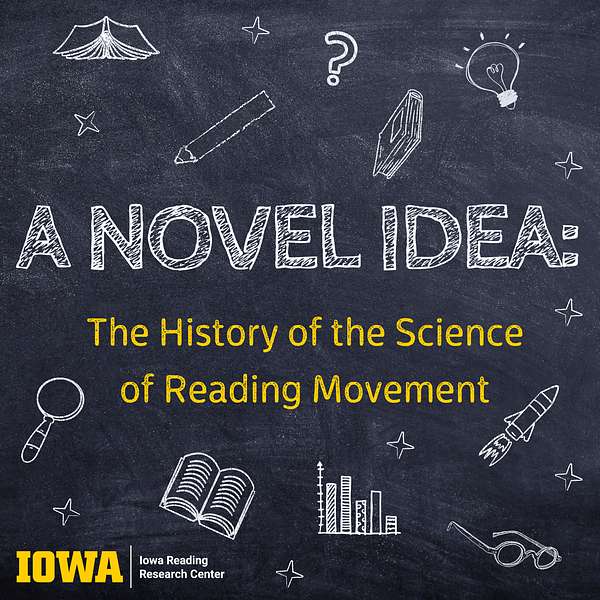
A Novel Idea: The History of the Science of Reading
Host Meg Mechelke explores the history of the science of reading and literacy instruction in the United States.
A Novel Idea: The History of the Science of Reading
Trailer: A Novel Idea: The History of the Science of Reading
A brand new, 8-episode podcast series, brought to you by the Iowa Reading Research Center, explores the historical roots of today’s science of reading movement.
Learn More
“U.S. education achievement slides backwards,” Jill Barshay, The Hechinger Report
Episode transcript and sources
https://irrc.education.uiowa.edu/transcript-and-sources-novel-idea-trailer
A Novel Idea website:
Sean Thompson: Tell me what you know about the science of reading.
Meg Mechelke: Um… probably less than I should.
September 26, 2022. I’m sitting in a small conference room with my editor Sean. We’re having our first meeting about making this podcast about reading instruction.
Meg Mechelke: I know that in Iowa and in the United States, literacy rates aren’t as high as you would expect them to be if you were just guessing. I don’t know what they are, I just feel like at one point it was cited to me and I was like woahhh.
We decided to focus on two big questions: How are we teaching our children to read? And how did we get here?
Meg Mechelke: So what I assume is that people started doing balanced literacy, and it was not working. And so then people who are, like, research-oriented were like “I bet I can come up with a better way to do this.” And then you get studies that are, like, based in research methods.
As it turns out, these are two complex questions that have historically resulted in bitter controversy and heated debate. In the 90s, the issue of literacy instruction became so intense that the term reading wars came into common usage to describe the explosive arguments over the best way to teach students to read. These Reading Wars split literacy researchers into two distinct camps: those who advocated for phonics-based instruction, and those who supported a method called whole language.
Meg Mechelke: I know that the idea is that you can’t teach kids to read by just giving them books and hoping they enjoy it. You have to teach from like the very little building blocks.
This was not a new debate. And the controversy did not end with the 90s. The number of Google searches for the term “science of reading” has more than doubled over the past year alone. And more than 30 states have passed laws or policies related to the issue of evidence-based reading instruction.
Today, the stakes for getting literacy instruction right could not be any higher. According to the nonprofit educational news organization The Hechinger Report, reading scores from the National Assessment of Educational Progress have been on the decline since 2019, and the pandemic has only made things worse. Before that, scores had remained unchaingly dismal for around 30 years for the students who struggle the most, and for a decade for students overall. Currrently, only 33% of fourth-grade students are reading at or above the proficient level.
Meg Mechelke: Sometimes students will do really well with reading for like the first couple years that they’re learning how to read, and so they’ll skip all of those little skills. And then all of the sudden things will get to a level where they cannot read difficult texts because they don’t have the skills to fall back on.
The solution? According to some, a concept called the science of reading.
But what is the science of reading? Where did this idea come from?
Reid Lyon: I get a call from Texas. He said, “This is George Bush. I’m the governor down here…”
Natalie Wexler: …these “skeleton-like shapes of letters will haunt these poor children.”
Nina Lorimor-Easley: Sam Orton and Anna Gillingham… what they brought to the field was massive.
Maryanne Wolf: It was romantic, it was political…
Emily Hanford: I think there's an awakening. People are learning more.
Lori Sappington: I think it's a little scary, too.
This is A Novel Idea. Over 8 episodes, we will explore the history of literacy instruction in the United States, starting from the Age of Enlightenment and progressing to the development of controversies and debates that are still happening today. We will define and discuss hot-button literacy terms and concepts, such as “Reading Recovery,” “the cueing system,” and “structured literacy.” We will examine the historical roots of instructional approaches such as look-say and whole language. And we will work to understand how these ideas became commonplace in classrooms across the country.
From the Iowa Reading Research Center, I’m Meg Mechelke. Coming June 8th, it’s A Novel Idea: The History of the Science of Reading Movement. Listen wherever you get your podcasts.
